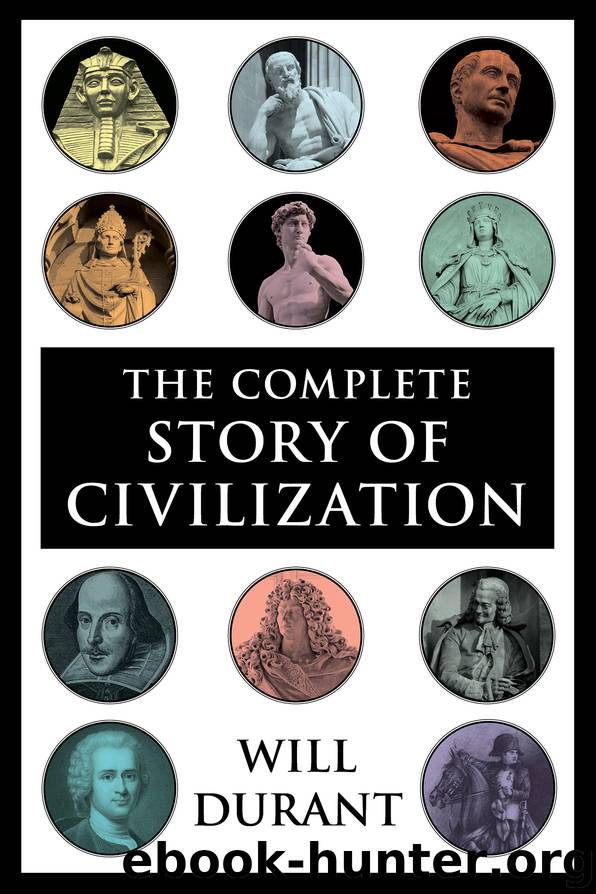The Story of Civilization Volume I: Our Oriental Heritage by Will Durant

Author:Will Durant [Durant, Will]
Language: eng
Format: epub
Publisher: Simon & Schuster
Published: 0101-01-01T00:00:00+00:00
II. THE SIX SYSTEMS OF BRAHMANICAL PHILOSOPHY
The antiquity of Indian philosophy—Its prominent rôle—Its scholars—Forms—Conception of orthodoxy—The assumptions of Hindu philosophy
The priority of India is clearer in philosophy than in medicine, though here too origins are veiled, and every conclusion is an hypothesis. Some Upanishads are older than any extant form of Greek philosophy, and Pythagoras, Parmenides and Plato seem to have been influenced by Indian metaphysics; but the speculations of Thales, Anaximander, Anaximenes, Heraclitus, Anaxagoras and Empedocles not only antedate the secular philosophy of the Hindus, but bear a sceptical and physical stamp suggesting any other origin than India. Victor Cousin believed that “we are constrained to see in this cradle of the human race the native land of the highest philosophy.”54 It is more probable that no one of the civilizations known to us was the originator of any of the elements of civilization.
But nowhere else has the lust for philosophy been so strong as in India. It is, with the Hindus, not an ornament or a recreation, but a major interest and practice of life itself; and sages receive in India the honor bestowed in the West upon men of wealth or action. What other nation has ever thought of celebrating festivals with gladiatorial debates between the leaders of rival philosophical schools? We read in the Upanishads how the King of the Videhas, as part of a religious feast, set one day apart for a philosophical disputation among Yajnavalkya, Asvala, Artabhaga and Gargi (the Aspasia of India); to the victor the King promised—and gave—a reward of a thousand cows and many pieces of gold.56 It was the usual course for a philosophical teacher in India to speak rather than to write; instead of attacking his opponents through the safe medium of print, he was expected to meet them in living debate, and to visit other schools in order to submit himself to controversy and questioning; leading philosophers like Shankara spent much of their time in such intellectual journeys.57 Sometimes kings joined in these discussions with the modesty becoming a monarch in the presence of a philosopher—if we may credit the reports of the philosophers. The victor in a vital debate was as great a hero among his people as a general returning from the bloody triumphs of war.58
In a Rajput painting of the eighteenth century59 we see a typical Indian “School of Philosophy”—the teacher sits on a mat under a tree, and his pupils squat on the grass before him. Such scenes were to be witnessed everywhere, for teachers of philosophy were as numerous in India as merchants in Babylonia. No other country has ever had so many schools of thought. In one of Buddha’s dialogues we learn that there were sixty-two distinct theories of the soul among the philosophers of his time.60 “This philosophical nation par excellence” says Count Keyserling, “has more Sanskrit words for philosophical and religious thought than are found in Greek, Latin and German combined.”61
Since Indian thought was transmitted rather by oral tradition than
Download
This site does not store any files on its server. We only index and link to content provided by other sites. Please contact the content providers to delete copyright contents if any and email us, we'll remove relevant links or contents immediately.
| Africa | Americas |
| Arctic & Antarctica | Asia |
| Australia & Oceania | Europe |
| Middle East | Russia |
| United States | World |
| Ancient Civilizations | Military |
| Historical Study & Educational Resources |
Guns, Germs and Steel by Diamond Jared(2370)
Collapse: How Societies Choose to Fail or Succeed by Jared Diamond(1520)
The Emperor of All Maladies by Siddhartha Mukherjee(1443)
Transcendence by Gaia Vince(1140)
148424513X by Unknown(1079)
Seven Skeletons by Lydia Pyne(1075)
Civilization One by Christopher Knight(1012)
Sapiens - A brief history of humankind (Marathi) by Yuval Noah Harari(997)
The Rational Optimist: How Prosperity Evolves by Matt Ridley(967)
THE MASTER AND HIS EMISSARY by Iain McGilchrist(945)
Guns, Germs, and Steel: The Fates of Human Societies by Jared M. Diamond(942)
At Home by Bill Bryson(911)
Underworld The Mysterious Origins of Civilization by Graham Hancock(907)
How the Irish Saved Civilization by Thomas Cahill(899)
Marco Polo by Laurence Bergreen(894)
Atrocitology by Matthew White(883)
Ancient Iraq by Georges Roux(863)
Guns, Germs and Steel: The Fates of Human Societies by Jared Diamond(856)
The World Until Yesterday: What Can We Learn From Traditional Societies? by Jared Diamond(855)
